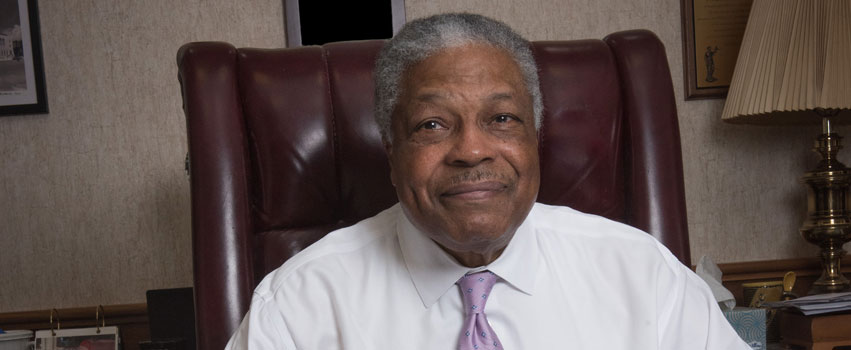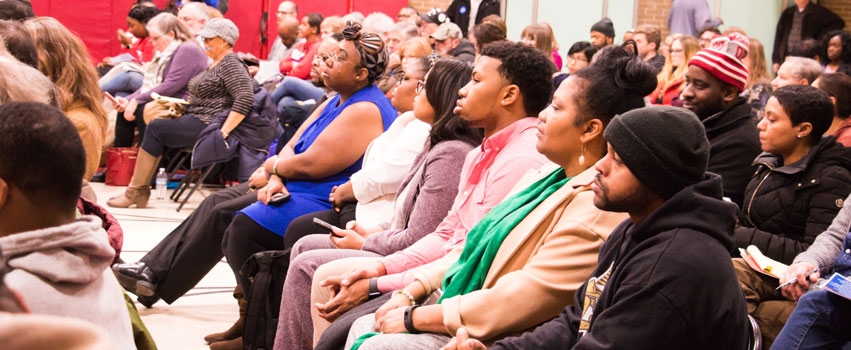Realizing the American Dream

On July 10, 2019, Peoria Magazine honored the lifelong accomplishments of Judge Joe Billy McDade, Ray Becker, Dr. Patrick Elwood, and Doug and Diane Oberhelman at the annual Local Legends reception. This intimate event provides an opportunity for friends, family and colleagues to come together and celebrate these Legends—as well as a chance for the Legends to say a few words to those who have gathered in their honor.
After being introduced by the Honorable Ray LaHood, Judge Joe Billy McDade stepped up to the podium. “I am honored and humbled by being included in this year’s group of Legends,” he began, adding that his own unlikely rise to the federal judiciary was an affirmation of LaHood’s opening remarks: “that if you do your best, play by the rules and try to contribute, you will be recognized.”
“I am not up here to extol my achievements,” Judge McDade continued. “I am here to share with you what most motivates me—and why I am who I am.” And with that, a hush fell over the crowd as he began to read from his prepared remarks. What follows is Judge McDade’s speech, published here by request from multiple attendees and fellow Legends who were moved by his words. It’s a message to the wider community—to all Peorians and to all Americans—about what freedom really is… and the challenges we face today in striving to maintain the ideals upon which our nation, however imperfectly, was built: democracy, rights, liberty, opportunity and equality.
![]()
As a member of a group of Americans who, for over 300 years, lived subjugated and socialized by slavery and its remnants, I understood at my core that I was not free growing up in Texas. When I first came to Bradley University in 1955 as a 17-year-old freshman, I expected my arrival in Peoria would be deliverance into freedom. But during my freshman year, I became aware that hundreds of years of living under those conditions had a fundamental, internalized effect antithetical to the essence of freedom. My soul, my mind and my self-worth were constrained and molded by the circumstances of my birth. But so too are the beneficiaries of these systems of oppression similarly molded and constrained: they also were not able to fully develop mentally and morally as truly free people.
Freedom, I realized, is more than just the lack of enslavement; it is a state of mind, an ingrained sense that one is possessed of a natural liberty in all respects equal to his neighbors’. Achieving it as a member of a group so long oppressed is not simply a matter of an epiphany or moving to a new location. Rather, it is the work over a lifetime, learning to instinctively think and act as a free-thinking person.
Today’s recognition is a validation of my efforts in that regard. Any ability I have had to positively affect the Peoria community was born from my realization that freedom was something I needed to manifest, not just have. I hope that by sharing my story I can inspire others to see the wisdom of searching within oneself for freedom in all its fullness. It is not possible to achieve it only through the beneficence of others or outside forces. We must also tend to our inner being—the secret place within where we harmonize our understanding of who we are and who we want to be.
Although the essence of the crop will reflect the quality of the seed, it helps to have fertile soil to grow, and I have found fertile soil in Peoria. I am honored to be recognized for my impact on a community which has had such an impact on me. Thanks to [Peoria Magazines] for this honor and the opportunity to voice my hope that all citizens of our community who share my concept of freedom will strive to achieve it as I have done.
Those are the considered words I wanted to share with you about what makes me who I am. But before I close, I’d like to say something else. Once the Constitutional Convention was over, a lady said to Benjamin Franklin, “Mr. Franklin, what kind of government have you given us?” He said, “A republic—if you can keep it.” He knew, as most of civilized society knew, that there had never been a nation conceived in liberty and dedicated to the proposition that all people are created equal. Other nations were ruled by monarchs, the noble class, the privileged class. But our founding fathers said, “We believe that God gave the common man the ability to govern themselves,” and they knew it wouldn’t be easy.
No one thought it would succeed. George Washington, in his farewell address, said he trembled for this country, because he knew what it would take. He knew there were factions, the states were individualistic, they were fighting each other, and he really feared civil war. Somehow, we got by that—at least for almost 100 years—but as I see it today, this nation, this republic is still at risk and needs to protect itself.
These are dangerous times. As I read George Washington’s farewell address, I noticed his emphasis on an educated citizenry. He said if we are going to take care of this nation, the common man must be educated. You must know enough to fight off the temptations of demagogues and other people who remain skeptical that we, the common man, can govern ourselves.
I also want to say that I don’t care what grievance we have against this country, and God knows blacks have a grievance—they were enslaved and for 300 years have lived under the remnants of slavery—and there are many whites who also feel that life has been unfair to them, that they are no longer accorded the benefits of “white privilege.” I want to say, to all of us, that if we are going to save this great nation, we must rise above our past grievances and look ahead to a better future for all of us in this republic. We must come together; we must put aside our differences; we must find common ground, learn to compromise, learn that we are in this together.
We have something in this country that is unique in the history of the world, and we are going to lose it if we continue to mistrust each other and continue our inability to communicate with each other. We must learn to disagree civilly and with love, keeping the best interest of the nation at heart. I wish all this for our country and think that Peoria is a good place to start.
In addition to Ray [LaHood]’s alliterations of my journey, I would add that I came from the proverbial one-room shack in Texas to Bradley University. That is where I first landed when I came to Illinois, and I learned so many things that shaped my character… [and] helped me to be who I am: Do your best the first time, because you may not get a second chance. Earn what you get, and you should get what you earn. Live for something greater than yourself. We certainly have a lot to live for, including a precious nation that I treasure and that everyone should treasure. PM
Read Judge McDade’s Local Legends interview in the July 2019 issue of Peoria Magazine.
